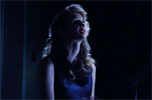Inland Empire
 While David Lynch's fans will love Inland Empire as the latest installment of Lynch's brand of surrealism, the film does not doom itself to discussion purely in terms of Lynch as the driving force. It is horrifying, and simultaneously it is perversely humorous. Inland Empire is something to be experienced, an inescapably captivating situation into a world woven by one of the remaining masters of American cinema.
While David Lynch's fans will love Inland Empire as the latest installment of Lynch's brand of surrealism, the film does not doom itself to discussion purely in terms of Lynch as the driving force. It is horrifying, and simultaneously it is perversely humorous. Inland Empire is something to be experienced, an inescapably captivating situation into a world woven by one of the remaining masters of American cinema.
A nightmare devoid of chronological narrative, Inland Empire, at its most concrete moments, is the story of Nikki, Devon, and a cursed film. Laura Dern, as Nikki, is powerful and consistent for the duration, an impressive achievement accentuated by the knowledge that the film was scripted as it was shot. Justin Theroux's performance as Devon is solid, and all the secondary characters are etched beautifully - played by seasoned actors such as Jeremy Irons and Harry Dean Stanton.
However, Lynch is quick to dismantle any amount, admittedly minimal, of narrative stability the exposition offers. Fluctuating identities, unresolved disappearances, problematic discrepancies between reality and dreamscape - it is all there as the film careens from relative normalcy to gut-wrenching chaos. Any remaining obligation for linear narrative Lynch allowed to linger in Lost Highway and Mulholland Dr. has been demolished this time around. He meticulously guides the audience to the verge of understanding and gladly tears it down.
As the narrative strategies Lynch has been refining are pushed to a new level, so too, characteristic Lynchian themes emerge at a new extreme. Discourses on the unrelenting machine of Hollywood and other notions in Lynch's previous two films are explored and portrayed more darkly than ever. Empire is the darkest crevices of Lost Highway and Mulholland Dr, only received as a glimmer in these films, manifested as a three-hour, devastating catharsis.
Inland Empire marks one final shift in Lynch's techniques: his cinematography. Moving away from the restrictions of film, Empire is composed entirely in digital video. It offers a grainy and mysterious quality, something Lynch has said he finds lacking in the over-perfected cinematography of 35mm. While DV certainly aids the atmosphere Inland Empire exudes, and Lynch's masterful framing has not been lost, the stigma surrounding DV leaves me curious as to the results on Empire if the capability to shoot on film was present.



